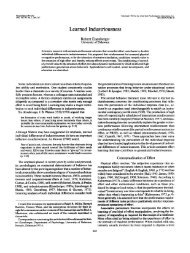Perceived Organizational Support
Perceived Organizational Support
Perceived Organizational Support
Create successful ePaper yourself
Turn your PDF publications into a flip-book with our unique Google optimized e-Paper software.
Coyle-ch10.qxd 1/16/04 3:00 PM Page 216<br />
216 Exchange Nature of Employment Relationship<br />
high POS may be less likely to believe that changes made by the organization result<br />
from malevolent intent. For instance, employees with high POS might be more likely<br />
to accept the organization’s position that the elimination of promised salary<br />
increases resulted because of hard economic times rather than a lessening concern<br />
with the employees’ welfare. As such, employees with high POS would be more<br />
accepting of rationales given by the organization and so would be inclined to adapt<br />
to organization-initiated changes to the psychological contract (Aselage and<br />
Eisenberger 2003).<br />
POS might also reduce the psychological strain experienced by employees when<br />
the organization proposes fundamental changes to the psychological contract. Shore<br />
and Tetrick (1994) reasoned that one function of the psychological contract is<br />
to reduce stress because it provides employees with a sense of predictability and<br />
control. By boosting self-esteem and assuring employees that aid is available when<br />
needed, POS might lessen perceived loss of control and consequent strain<br />
when employees experience major organizational change (Aselage and Eisenberger<br />
2003).<br />
10.6.2 Early employee socialization<br />
Longitudinal research has indicated that POS is subject to systematic changes<br />
throughout employees’ tenure in organizations (e.g. Rhoades et al. 2001; Eisenberger<br />
et al. 2002). However, we know little about the development of POS very early in<br />
employees’ tenure. During pre-employment, a period that stretches from an individual<br />
first hearing about a prospective employer through the hiring process, and<br />
during the subsequent early stages of employment, newcomers typically have little<br />
information about their employing organization. Newcomers are motivated to find<br />
out more about the organization’s general culture, their roles in the organization<br />
(Morrison 1993a,b), and the organization’s general benevolence or malevolence<br />
toward its employees.<br />
Potential employees may rely on sources outside the organization, such as friends,<br />
family, and career counselors, for credible information regarding the organization’s<br />
overall reputation in the community (Fisher et al. 1979; Cable et al. 2000).<br />
Information gathered from social networks outside the organization should be especially<br />
potent in framing employees’ initial levels of support, because the information<br />
is communicated by familiar individuals who likely have little vested interest in portraying<br />
the organization in an inaccurate light (cf. Popovich and Wanous 1982).<br />
However, the strength of the contribution of information from outside sources to<br />
employees’ initial level of POS would be contingent upon the amount and depth of<br />
information available from the source. For instance, the views of a friend who is a<br />
former employee of the organization should contribute more to initial POS than the<br />
views of another who has a vague recollection of something favorable or unfavorable<br />
about the organization.<br />
As previously noted, promises made to employees and requests denied during job<br />
recruitment and negotiations would be expected to influence POS (Aselage and



